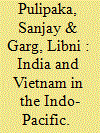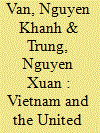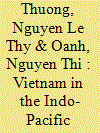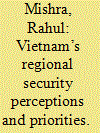|
|
|
Sort Order |
|
|
|
Items / Page
|
|
|
|
|
|
|
| Srl | Item |
| 1 |
ID:
180081


|
|
|
|
|
| Summary/Abstract |
Free and Open Indo-Pacific (FOIP) is considered a US strategy to deal with China and maintain and expand its influence in the Indo-Pacific region. Though FOIP is considered an initiative of the United States, implementing it successfully requires the participation of the Quad including the United States, India, Japan and Australia. Besides the Quad, other factors coming from the developing economies of the region will be indispensable components of FOIP. The article gives an overview of the FOIP as well as analyses the stands of ASEAN and Vietnam on this strategy from the perspective of the Vietnamese scholars.
|
|
|
|
|
|
|
|
|
|
|
|
|
|
|
|
| 2 |
ID:
180080


|
|
|
|
|
| Summary/Abstract |
The international order today is characterised by power shift and increasing multipolarity. Countries such as India and Vietnam are working to consolidate the evolving multipolarity in the Indo-Pacific. The article maps the convergences in the Indian and Vietnamese foreign policy strategies and in their approaches to the Indo-Pacific. Both countries confront similar security challenges, such as creeping territorial aggression. Further, India and Vietnam are collaborating with the United States and Japan to maintain a favourable balance of power in the Indo-Pacific. While Delhi and Hanoi agree on the need to reform the United Nations, there is still some distance to travel to find a common position on regional economic architectures. The India–Vietnam partnership demonstrates that nation-states will seek to define the structure of the international order and in this instance by increasing the intensity of multipolarity.
|
|
|
|
|
|
|
|
|
|
|
|
|
|
|
|
| 3 |
ID:
180087


|
|
|
|
|
| Summary/Abstract |
The rise of China and its impact on regional as well as global power structure has invited a plethora of rigorous scholarly analysis. Same has been the case for how global powers like the US in particular and its neighbours in general respond to its rise. However, if, on the one hand, the question of China’s rise has made realism and the balance of power dynamics as the cynosure of international relations (IR), the response of most of its neighbours has challenged its parsimonious ‘balancing–bandwagoning’ dichotomy. To come to the terms with new realities, scholars have come up with a new category that moves beyond this dichotomy. The new category is hedging and is hailed to be the best explanation of states behaviour when they neither balance nor bandwagon. While engaging with the extant debate on hedging in IR, this article provides a comprehensive analysis of two of China’s most affected neighbours: India and Vietnam. This article argues that not only does hedging provide the best explanation of how they respond to China, alone as well as in cooperation, but also is the most alluring option available to them. Furthermore, this article, apart from examining the driving factors of their hedging behaviour, also provides some important policy implications for policymakers of New Delhi and Hanoi in the concluding section.
|
|
|
|
|
|
|
|
|
|
|
|
|
|
|
|
| 4 |
ID:
180085


|
|
|
|
|
| Summary/Abstract |
Defence and security cooperation between India and Vietnam is an increasingly important area of the India–Vietnam ‘comprehensive strategic partnership’. This wide-ranging cooperation includes government-to-government dialogues, bilateral agreements, defence lines of credit, prospective defence procurements, maritime cooperation and multilateral cooperation.
Cooperation has been formalised and expanded through a series of bilateral defence and security agreements to provide a basis for enhancing relations, which have been further developed through regular government-to-government dialogues. The defence and security dialogues and agreements have provided a framework for practical cooperation between the two countries’ militaries, which includes a focus on defence training, military exercises and discussions for the sale of different Indian arms equipment to Vietnam. Maritime cooperation between India and Vietnam has been the most significant element of bilateral defence and security cooperation, and both sides have found mutual convergences on cooperation in the South China Sea and the wider Indo-Pacific region.
Relations between the two countries have also strengthened multilaterally on defence and security issues, including through the Association of Southeast Asian Nations. There are opportunities to further strengthen the India–Vietnam defence and security relationship, both bilaterally and with third countries.
|
|
|
|
|
|
|
|
|
|
|
|
|
|
|
|
| 5 |
ID:
180082


|
|
|
|
|
| Summary/Abstract |
India–Vietnam strategic partnership has become consolidated but is far below its potential due to negligence of economic and other non-strategic dimensions. The emergence of the Indo-Pacific offers considerable scope and opportunity for Vietnam to expand its strategic outlook beyond its vicinity, befitting an emerging economic tiger as it encompasses a much larger region. Vietnam is far better placed to play a key role in the emerging geopolitical and geoeconomic equation if it can leverage its strengths appropriately. That will also help to further strengthen its partnership with India. For that, Hanoi needs to evolve its own Indo-Pacific vision followed by a strategy whereby it can enhance its strategic heft, which can be quite handy in dealing with China.
|
|
|
|
|
|
|
|
|
|
|
|
|
|
|
|
| 6 |
ID:
180088


|
|
|
|
|
| Summary/Abstract |
India and Indonesia are two key emerging economies in the Indo-Pacific region—both with a strong reliance on the maritime domain for sustained economic growth. After a relatively tumultuous phase in their bilateral relations during the Cold War, the countries have embarked on a path of reconciliation and developing stronger ties.
During this phase, there has understandably been a strong focus on enhancing maritime security cooperation between them, so as to obtain positive bilateral and regional outcomes. This has gained impetus in recent years with congruence of thought at the political level in both New Delhi and Jakarta. However, the many institutional mechanisms developed over the years have not been as effective in engendering tangible security outcomes in the region. Both countries—and indeed the Indo-Pacific region—would decidedly benefit from focusing on key areas of cooperation in maritime security that promise mutually beneficial operational outcomes and the prospect of establishing long-term cooperative mechanisms in the Indo-Pacific region.
|
|
|
|
|
|
|
|
|
|
|
|
|
|
|
|
| 7 |
ID:
180089


|
|
|
|
|
| Summary/Abstract |
It is noticeable that India–Vietnam relations have remained stable and had signs of development despite the new challenges in the global and regional environment due to COVID-19 pandemic. The authors of this article are of the view that one of the factors that help maintain the stability and development of bilateral relations in the current context is public diplomacy. Since the beginning of the twenty-first century, India has invested a huge amount of resources in public diplomacy to leverage India’s soft power. A dedicated public diplomacy division within the Ministry of External Affairs was set up in May 2006, many new schemes were designed to engage domestic and foreign public opinion and a series of high-profile dialogues with foreign think tanks were organised. By utilising both traditional and new approaches of public diplomacy, India is actively seeking new audiences within and outside India. India’s foreign policymaking process has become more open and democratic with the contribution of communities outside the New Delhi political and diplomatic elite. New media has also been utilised to reach its various target audiences. Vietnam considers public diplomacy an important pillar of the comprehensive diplomacy of the country. Public diplomacy helps Vietnam succeed in implementing comprehensive and effective foreign policies. It contributes important part in building cooperative, peaceful and friendly relations between Vietnam and international partners. The importance that both India and Vietnam attach to public diplomacy has many implications for strengthening Vietnam–India relations in the current context. This article focuses on India and Vietnam’s public diplomacy as an instrument of strengthening bilateral relations, and thereby proposes suggestions for both sides to enhance cooperation in the future.
|
|
|
|
|
|
|
|
|
|
|
|
|
|
|
|
| 8 |
ID:
180086


|
|
|
|
|
| Summary/Abstract |
After 25 years of normalisation, the Vietnam–US relation has developed and yet entered the new expectation to become the strategic partnership. Many motives and obstacles from both sides have had a strong impact on this development. In order to strengthen its presence in Asia and prevent the rise of China, the United States needs the support from the important partners like Vietnam. Likewise, Vietnam also pays high attention to the United States, which is a potential market for the country’s exports, an investor, an advanced technology supplier and an important security supporter in the territorial disputes against China. Such reasons help both sides to be closer and to construct the scenario of new strategic partnership relations. However, the concretisation of this scenario has encountered many difficulties, mostly because Vietnam was not ready enough. Vietnam has not yet been persuaded to trust the United States on many issues; meanwhile, the differences among Vietnamese political groups about promoting the relations with the United States and especially the concern about China’s response to upgrading Vietnam–US relations were the main obstacles for Vietnam to pursue the strategic partnership relations, especially in security and defence cooperation with the United States.
|
|
|
|
|
|
|
|
|
|
|
|
|
|
|
|
| 9 |
ID:
180079


|
|
|
|
|
| Summary/Abstract |
The Indo-Pacific region is an area adjacent to some oceans and the gateway that connects the great power and small countries to the world; this region is always considered by Vietnam as a key strategic geographic area, having direct impact on national security, position and its role in this region. While big powers have different perceptions of the Indo-Pacific region, as a country occupying an important geographic position in the Pacific region, Vietnam shares a common vision of an open and rule-based area, and a common interest in maintaining peace, stability and prosperity as well as building a common space for coexistence and development with the belief that the Indo-Asian-Pacific is large enough for every nation to grow and prosper. This article finds out that recent changes in the Indo-Pacific region in geopolitics, economics, security and national defence have made many countries, including Vietnam, redefine their global and regional policies to refresh their strategic perceptions. Vietnam has its own perception, position, approach and national orientations, which is shaping its state behaviour and perspectives in this geopolitically vibrant Indo-Pacific region. Besides, this article uses the SWOT analysis model to determine the challenges, strengths and weaknesses of Vietnam in the Indo-Pacific region. Moreover, while the future of the Indo-Pacific in a post-COVID-19 pandemic world remains filled with uncertainty and economic challenges, the crisis also presents an opportunity for Vietnam to re-evaluate its position. Today, Vietnam always maintains its foreign policy of independence, self-reliance, multilateralism and diversification of international relations, which attaches great importance to enhancing multi-faceted cooperation with countries in the Indo-Pacific region. Thus, with its own perception and geostrategic advantage, Vietnam—a developing country in the region and in the world with relatively stable economic growth, pursuing rules and order will be a positive factor for a stable, peaceful and prosperous development in the region.
|
|
|
|
|
|
|
|
|
|
|
|
|
|
|
|
| 10 |
ID:
180084


|
|
|
|
|
| Summary/Abstract |
Over the past several decades, India and Vietnam have consolidated their relationship through bilateral engagements, which have been complemented by the Association of Southeast Asian Nations (ASEAN)-led multilateral mechanisms such as the East Asia Summit, ASEAN Regional Forum, ASEAN Defence Ministers’ Meeting Plus and the India-led Mekong–Ganga Cooperation (MGC). Building up on their traditionally strong relations, India and Vietnam have widened and deepened their defence and strategic links in recent years, which is manifested in joint trainings, military exercises and defence Lines of Credit offered by India. Since the 1990s, especially over the last decade, both India and Vietnam have made strategic readjustments to elevate their respective bilateral ties with like-minded countries bringing about new commonalities in their politico-strategic visions and policies. Like India, Vietnam too is trying to bring the multilateral and multi-dimensional Indo-Pacific agenda to the mainstream of its foreign policy calculations, facilitated by greater warmth in ties with Japan and the US. Vietnam’s embracing of the Indo-Pacific is also in sync with ASEAN’s Outlook on Indo-Pacific. It also aligns well with Vietnam’s long-standing policy of ‘Three Nos’, expanded to four in its 2019 Defence White Paper. While recent developments in the South China Sea have exacerbated Vietnam’s growing anxieties vis-à-vis China, considering its trade interlinkages and dependence on China (and Russia), it is apparent that Vietnam is not yet ready to uproot its multilayered linkages with China and get on board the ‘Quad Plus’ initiative that is perceived as an overtly anti-China coalition of democracies. India–Vietnam ties, therefore, must rely on the bilateral plank along with ASEAN-linked mechanisms, MGC and the Indo-Pacific construct while trying to develop concerted actions through deeper cooperation with Japan and the US. In short, any initiative to include Vietnam in a Quad Plus mechanism without sufficiently developing synergies with individual countries would not yield desired outcomes. This article argues that India–Vietnam ties would benefit most by attaching their bilateral pillar of relationship with the ASEAN- and Indo-Pacific-centred inclusive multilateral mechanisms while gradually engaging the US, Japan and other potential partners in suitable frameworks.
|
|
|
|
|
|
|
|
|
|
|
|
|
|
|
|
| 11 |
ID:
180083


|
|
|
|
|
| Summary/Abstract |
The geostrategic, political and military position of the Indo-Pacific region has become increasingly important to major countries, in terms of influence and opportunities for developing cooperation and strategic restraints. India is a rising power gaining more influence in the region, and the Indo-Pacific vision initiated by Prime Minister Modi is a move to assert its greater position and role in the region. In that vision, India actively raises issues related to the South China Sea (SCS) in its foreign affairs as well as conducts capacity support for littoral countries. In this context, Vietnam is putting its great attention to the policy moves and stance of India towards the region, as well as the SCS, and is taking advantage of India’s policy to strengthen cooperation between Vietnam and India, especially in the SCS. The prospects for cooperation between the two countries in the future will surely be expanded further when both countries understand each other’s policies and needs.
|
|
|
|
|
|
|
|
|
|
|
|
|
|
|
|
|
|
|
|
|